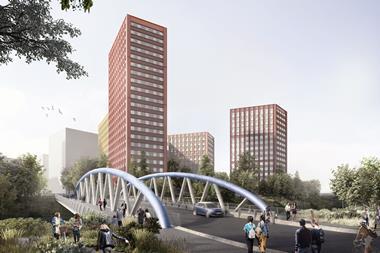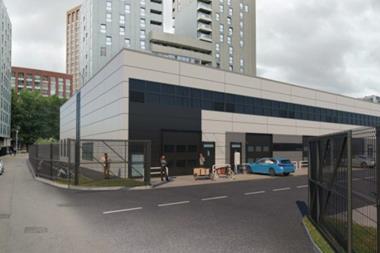A year ahead of stepping up to lead its global business, Grosvenor Britain & Ireland’s chief executive Craig McWilliam discusses the future of the West End and the challenges of fighting climate change and rebuilding trust in planning in our latest RESIcast.
Against a backdrop of volatility in the global political landscape, Craig McWilliam boasts a calm, relaxed demeanour. Like much of the Mayfair and Belgravia estates that sit at the heart of Grosvenor’s global portfolio, McWilliam is here for the long term. The boss of Grosvenor’s Britain & Ireland division has one year left before moving up to become global chief. But you get the sense that his love affair with London real estate isn’t about to end.
“The great thing about my current role is that it is representing a really exciting business with a wonderful team of people who really want to deliver the best outcomes, not only for the company but for London and the communities we live and work among,” McWilliam explains.
“My new role is much more internationally focused and so the challenge is beginning to think about how Grosvenor can create good commercial and social outcomes and how it is helping communities globally not just in the UK.”
Despite headline-grabbing warnings from KPMG recently about a 7.5% fall in house prices, McWilliam is focused on the long-term vibrancy of London. “I remember that 20 or so years ago London was not as successful and as cosmopolitan as it is now. I think we can take that for granted,” he says.
One of the recent hot topics of debate in the West End has been around Oxford Street, which McWilliam believes needs to be seen as “a district, not just a street”. He reinforces the point that half the area’s employment comes from office space, while thousands of local residents mingle daily with shoppers and tourists.
“Collaboration is absolutely vital, no single player can have the right impact if they aren’t working with their neighbours.”
“Trying to find something that balances the needs of all of these groups is really important but none of them want it to be a failure,” he says about moves to pedestrianise the thoroughfare and reduce car use across the West End.
“I grew up in York and in the 1980s they pedestrianised the whole city centre. There were all these concerns about how it would work, but in the end it all got dealt with and it made York much more successful.”
He talks passionately about reducing congestion, improving greenery and having a district focus to “make it more permeable, attractive and beautiful”.
Another thing that needs to be beautified is the reputation of real estate itself – a subject that Grosvenor has been unafraid of standing up and speaking out about. In July, the company published startling research around rebuilding trust in real estate and planning.
“The results were very stark,” McWilliam admits. “Almost nobody trusts developers to do the right thing. They also don’t trust local authorities to be acting in their best interest and they don’t think that the planning system is going to act to defend their interests.”
“Almost nobody trusts developers or local authorities. Some people might say ‘so what?’ But actually, the planning system is the front line in a democracy.”
However, with some of the headlines that appear on a weekly basis about poor-quality housing or profits from Help to Buy, a lack of public trust is unsurprising. “We are all put into one box,” he admits. “People draw conclusions about whether they think the system works well or not by looking in the press and finding examples.”
Of course, by far the biggest challenge on the table now is climate risk and McWilliam has a firm view that the real estate sector needs to step up to the plate. “We said that we want the parts of buildings that we look after to have net-zero carbon emissions by 2030,” he explains. “We also want to make sure that our buildings are capable of being operated on a net-zero basis.”
Craig McWilliam, Grosvenor Britain & Ireland CEO
“That distinction is all about the fact that a landlord only controls parts of a building – the rest of it is run by the tenant. So we want to work with our tenants to ensure our buildings can be operated in the most sustainable way. We want to work with our supply chain so that the maintenance, servicing and refurbishment are all equally sustainable and helping support our ambitions.”
With the vast array of heritage assets across Mayfair, this will not be an easy task, but one McWilliam is certainly eager to tackle.
“Just because it’s difficult doesn’t mean you shouldn’t try and do it,” he says.
You can listen to this podcast via iTunes or Spotify or SoundCloud or through the player above. This podcast was produced by Blackstock Consulting [www.blackstock.co.uk] founder Andrew Teacher and you can Tweet your views @andrewjteacher and @RESIevent
































No comments yet